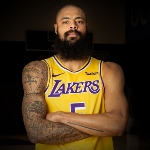 The Los Angeles Lakers yesterday signed Tyson Chandler to bolster their frontcourt after he cleared waivers to finalize his buyout process with the Phoenix Suns. But why exactly did the Lakers add Chandler?
The Los Angeles Lakers yesterday signed Tyson Chandler to bolster their frontcourt after he cleared waivers to finalize his buyout process with the Phoenix Suns. But why exactly did the Lakers add Chandler?
The short answer is to improve their struggling defense but to understand what motivated the Lakers to add Chandler we need to thread deeper.
On offense, Chandler gives the Lakers a running center that can finish in the paint at a high rate. He’s always been very efficient from the field as most of his shots come from a few feet from the rim.
He doesn’t have a great jump shot to use on a regular basis, so he can’t help the Lakers stretch the floor, but defensively he can fill in a JaVale McGee-like role, stepping up around the rim with blocks and physical play whenever the starter needs a breather.
Playing with Rajon Rondo off the bench should benefit Chandler once they get some chemistry together as Rondo has the skills to find him when he’s open, under or close to the rim, for high percentage shots.
But perhaps one of the main reasons that the Lakers signed Chandler is that he has the skills to set very solid picks on offense for his teammates to help free them for open shots, something that should especially benefit LeBron James.
Although he no longer is an elite defender (as he was in 2011-12 with the Knicks) he’s still more than a decent rim protector at this stage of his career. He has great timing and an above average level of athleticism left that allow him to effectively contest shots.
He may not get a lot of blocks at this stage in his career, but he still is a factor inside the paint defensively as he still forces opposing teams to change their shot selection and is a better rim protector than any of the current big men backups the Lakers currently have.
It’s true that he can’t switch on defense, something that should limit his play time, but since his main job will be to protect the rim the Lakers will find great use for him in that area and he should fill in that role pretty well.
Overall fans should not expect too much from the 36-year-old Chandler as he will come off the bench to play about 15 minutes per game as he splits time with McGee and Ivica Zubac or sits on the bench when the Lakers decide to use smaller lineups.
Chandler should be a very good fit with the Lakers as he should be able to be solid on both ends of the floor and become the backup center the Lakers desperately need to improve their ineffective defense.




